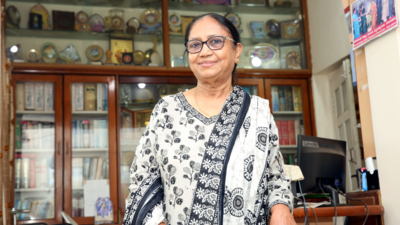- News
- 'Need for more translations to take our literary treasures to the global stage'
'Need for more translations to take our literary treasures to the global stage'
Banu Mushtaq’s translated short stories have just made it to the Booker longlist but the 77-year-old is more than a writer — she is also an advocate and an outspoken activist who has spotlighted the cause of Muslim women through her literary and legal work.
Shrinivasa M
spoke to the Kannada author, whose stories have been made into an award-winning film as well as being featured in literary magazines like The Paris Review and The BafflerWhat was your reaction to ‘Heart Lamp’ making it to the International Booker longlist ? You’ve received many national awards before but was this a surprise?
For a moment, I couldn’t even grasp what our literary agent was saying. Then, as congratulatory messages poured in, the atmosphere turned festive. At first, I saw it as a personal achievement, but watching my colleagues celebrate made me realise it was a collective success. More than anything, it’s a recognition of the Kannada language, Karnataka’s rich literary heritage, and the people of India on the global stage.
Your stories often challenge caste, class, and gender hierarchies. What inspired the narratives in this anthology?
‘Heart Lamp’ is the English translation of my anthology ‘Edeya Hanate’. My inspiration comes from daily life —observing society, people, and the compelling human stories I come across in newspapers and in my practice. As an advocate who offers free mediation services, I often witness clients, especially women, sharing not just legal concerns but also their emotional struggles. During these sessions, I maintain two sets of notes—one for legal aspects and another on their personal journeys. These emotional narratives form the foundation of my creative work. Short stories come naturally to me as I feel I can effortlessly transform daily interactions into compelling narratives.
How did you choose which stories to include in this collection for international readers?
The selection was a collaborative effort between my translator Deepa Bhasthi and me. She read my five anthologies, and we discussed which stories to include. Some moved and disturbed her deeply, and I honoured her choices because if a story impacts her, it will resonate globally. The injustices of male dominance and societal hierarchies exist everywhere, and women across cultures will find themselves in these stories.
You were a key part of the 1970s Bandaya Sahitya movement. How did it shape your writing and what is the relevance of the resistance movement today?
The Bandaya movement inspired multiple social movements, including for rights of women and Dalits. Working in Hassan, a hub of activism, I witnessed protests daily, and my work documents personal experiences of humiliation, struggle, and resistance, allowing me to reflect and find solace through storytelling. Bandaya is a mindset — it’s about resistance against societal injustice and it remains a way of life for me. While society is not always unjust, certain periods impose rigid norms, demanding blind adherence. At such times, we must challenge these restrictions. I continue to question societal, political, and religious structures, particularly male dominance.
You have strongly supported the cause of Muslim women, even braving a social boycott in 2000. Do you feel issues like the hijab have become politicised and become a tool to target Muslims?
What is the role of literature in social change?
Literature has the power to influence decisions and perspectives. Recently, a Muslim woman from the coastal region sought legal advice from me. She told me that watching ‘Hasina’—a Kannada film made by Girish Kasaravalli which is based on my story of a woman deserted by her husband after he finds her pregnant with a fourth daughter—helped her find answers to her struggles. That moment reaffirmed my belief that literature can shape lives, encourage resistance, and offer solutions.
Were there any challenges in translating ‘Heart Lamp’?
Yes, especially due to the regional and linguistic nuances. I use Hassan dialect, colloquial Kannada, and many Urdu and Arabic words, which are difficult to translate. Deepa consulted publishers and ultimately retained many native terms. She met me multiple times for clarifications. She put in immense effort.
With ‘Heart Lamp’ gaining global recognition, will you write more for an international audience?
I have always written for myself and Kannada readers, without considering a global audience. My commitment remains to human experiences. My style and expression may evolve, but my core themes will not change.
End of Article
FOLLOW US ON SOCIAL MEDIA

